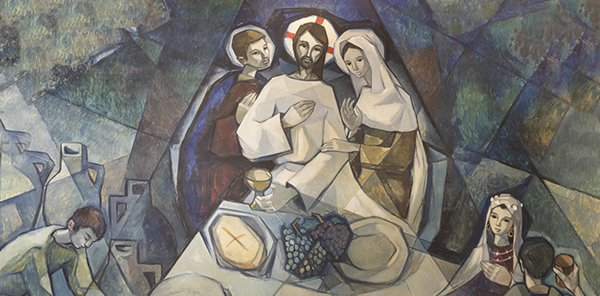
V/ I will turn to you O God,
R/ to God who gives joy to my youth
V/ Give me the Wisdom that sits by your throne;
R/ that I may be counted among your children
Lord, in your all-providential plan, you have led me to this moment to rediscover me in your Word and Wisdom. Aid me to make this time of meditation and prayer enriching, transforming, and liberating for my well-being and others. Amen!
SECOND SUNDAY IN ORDINARY TIME, YR C
19th January 2025
By Dr Heather Ward, OCDS
Isaiah 42:1-7; Psalm 104 (103): 1-30; Titus 2:11-14; 3:4-7; Luke 3: 15-22
I think any Jew or Christian of the time in which John’s gospel was written would hear in this account of the wedding at Cana a twofold message. Here is the Messiah, the Restorer, bringing in his kingdom, announcing his kingly rule. But, more than that, here is the bridegroom, restoring his people because of his spousal love for them.
They might hear behind the story not only our first reading from Isaiah, but also the more explicit declaration in Isaiah 54-4. For your maker is your husband, the Lord of hosts is his name, and the Holy One of Israel is your Redeemer. And they would recognize that this celebration represents the final action in a marriage that follows the earlier betrothal.
The bridegroom has arrived to take his bride to his home. So we are here at the inauguration of the kingdom, experiencing the already and the not yet of the wedding feast of the Lamb. Perhaps the Christian hearer would also hear echoes of Luke’s account of the Last Supper, where Jesus links his drinking wine with the coming kingdom.
Similarly, those water jars for ritual purification might bring thoughts of John’s account, where Jesus washes feet, another purification ritual, before meeting his hour as bridegroom. So, this account is truly a sign, not so much a miraculous demonstration of God’s power but a declaration of Jesus’ identity and of the abundant life he opens up to us. We are given a foretaste of the final feast, and in John’s gospel, a sign is also a challenge.
Do we recognize it and respond to what we are shown? Here the challenge is twofold, to recognize and affirm our faith in Jesus as Son of God, as Savior, but then to ask, what does this mean for me now? What does affirming Jesus as the bridegroom seeking an intimate relationship with me mean? But also to affirm that he is Lord, under whose kingly rule I am called to live. While I think of St. Teresa, for whom Jesus is my spouse and his majesty, it’s to St. John of the Cross that I turn for some help. In his sketch of the ascent of Mount Carmel, we find two statements, only the honour and glory of God dwells on this mount. And his adaptation of Jeremiah 2 verse 7, I brought you into the land of Carmel to eat its fruit and good things, which resonates with Isaiah 25 verse 6. On this mountain, the Lord of hosts will make for his people a feast of fat things, a feast of wine on the lees.
He will swallow up death forever. John makes it clear in the sketch that the way to the abundance of the feast, ultimately the heavenly banquet, is only by setting the desire for a spousal relationship at the centre of every thought, desire, feeling, and action, allowing his kingly rule over every aspect of my being. It involves saying no to all the false gods our culture holds out to us as solutions to our ills, or at least as an escape from them, and no to all the memories, dreams, and expectations that limit our vision and our compassion, restricting the space in our lives for God’s action.
What can help us on this path is the advice of the 14th century Augustinian Walter Hilton, like John of the Cross, would have us remember that all these refusals are for the sake of becoming one with the bridegroom and enjoying the fullness of his love, the ultimate feast. Purification from our idols is an inescapable aspect of our ascent of Mount Carmel. Thinking about purification leads me back to those jars where water for purification becomes the wine of the kingdom.
Liturgically we identify such water as our humanity destined for participation on God’s. By the mystery of this water and wine may we come to share in the divinity of Christ. And so to the Eucharistic resonances of our story, the way of purification, to union, to becoming totally subject to the just gentle rule of Jesus centres me on the Eucharist, source and summit of Christian life and foretaste of the wedding feast of the Lamb.
Daily Offering
Lord, I offer myself to you anew, in scaling the heights of Carmel by taking to heart your Word and Wisdom communicated through this time of meditation. May I be transformed into a prayer presence in the World. Amen
• What does affirming Jesus as the bridegroom seeking an intimate relationship with me mean?
• In what ways is God’s abundance a purifying action for my insufficiencies and inadequacies?
• How does the Eucharistic presence sit with my Christian commitment to the kingly rule of Christ in all facets of my life?
Suggested Exercise for the Week
Explore ONLY simple and tangible ways of expressing my love for God and my neighbour.
Commit to Heart: By this mystery of water and wine, may I come to share in the divinity of Christ, who humbled himself to share my humanity.
